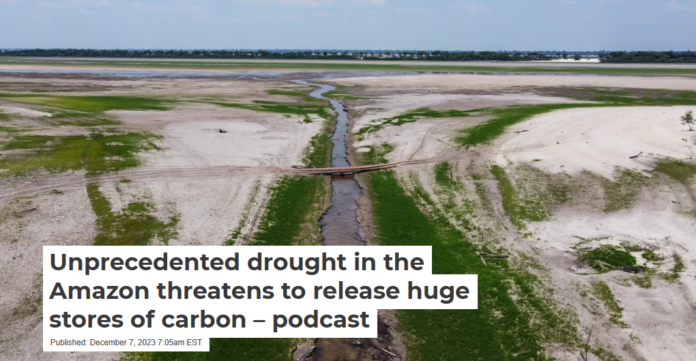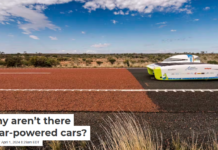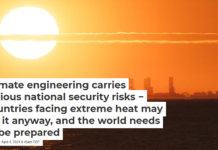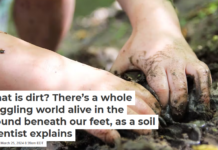
Gemma Ware, The Conversation
As world leaders and their climate negotiators gathered at the COP28 climate summit in Dubai in early December, on the other side of the world, Brazil was experiencing an unprecedented drought in the Amazon. Scientists fear it could release of billions of additional tons of carbon into the atmosphere.
In this episode of The Conversation Weekly podcast, we speak to an ecologist who has spent 45 years living in and studying the Amazon for causes of drought, why it’s so dangerous for the planet, and what can be done to protect the rainforest. https://embed.acast.com/60087127b9687759d637bade/6570ad3bee848100123bc3f3
Philip Fearnside lives in Manaus, a city of around 2 million people in Brazil’s Amazonas state. A professor at the country’s National Institute of Amazonian Research, he explains that right now, the region is suffering from a severe and unprecedented drought:
It’s the lowest water levels at Manaus since data started being recorded in 1902, so 121 years. The trees are dying. There’s a big cannelier tree in my front yard that just died from one day to the next.
The drought also leads to fires, with smoke causing pollution levels in Manaus to soar. Elsewhere, the Amazon river bed is being exposed, making life difficult for people who live and work near the river. Animals are also suffering: in September, 150 river dolphins were found dead in Lake Tefé, where water temperatures had reached 39°C.
Fearnside explains that the drought is caused by three interlocking factors. Two are El Niño climate patterns caused by warm water in both the central and eastern Pacific Ocean. The third is what’s called an Atlantic dipole: a patch of warm water in the north Atlantic Ocean which, combined with colder water in the south Atlantic, affects rainfall patterns in the Amazon:
It won’t be until May or June that the probability of having normal water temperature in the centre of the Pacific Ocean at least passes 50% … so we’ve got a long time with droughts ahead of us.
While it’s difficult to pinpoint the cause of this particular drought as climate change, Fearnside says the frequency of El Niños and Atlantic dipoles “is much much greater because of climate change”.
Climate tipping point
The Amazon holds enormous stores of carbon. Its trees alone store around 80 billion tonnes of carbon, with another 90 billion in the first metre of soil. Fearnside likens this to a latent bomb that could explode unintentionally, because the droughts and the forest fires could destroy those carbon stores and release more CO₂ into the atmosphere:
Everyone hears about how much deforestation there is every year, and how much greenhouse gases are emitted, but this big store of carbon that isn’t being emitted isn’t talked about so much. And that could really be the straw that breaks the camel’s back in terms of global climate. Just a fraction of that going into the atmosphere in the space of a few years could push the climate over this tipping point. So it’s essential not to let that happen.
Fearnside has a message for climate negotiators at the COP28 climate summit: that it’s obvious the use of fossil fuels must be reduced immediately and “eventually eliminated”.
For Brazil, he says the government should not be expanding new gas and oil fields in the mouth of the Amazon river, and has to work in a joined up way to eliminate all deforestation in the Amazon by its stated target of 2030.
Listen to the full interview with Philip Fearnside to find out what else needs to be done to protect the Amazon on the The Conversation Weekly, and read an article he wrote here too. A transcript of this episode will be available soon.
This episode was written and produced by Katie Flood with assistance from Mend Mariwany. Gemma Ware is the executive producer of the show. Our theme music is by Neeta Sarl.
Newsclips in this episode from WION, UOL and Reuters.
You can find us on X, formerly known as Twitter @TC_Audio, on Instagram at theconversationdotcom or via email. You can also subscribe to The Conversation’s free daily email here.
Listen to The Conversation Weekly via any of the apps listed above, download it directly via our RSS feed or find out how else to listen here.
Gemma Ware, Editor and Co-Host, The Conversation Weekly Podcast, The Conversation
This article is republished from The Conversation under a Creative Commons license. Read the original article.




















